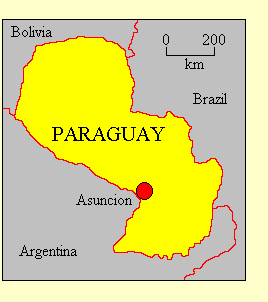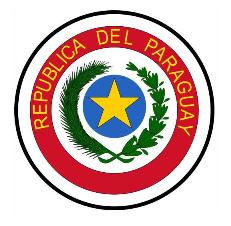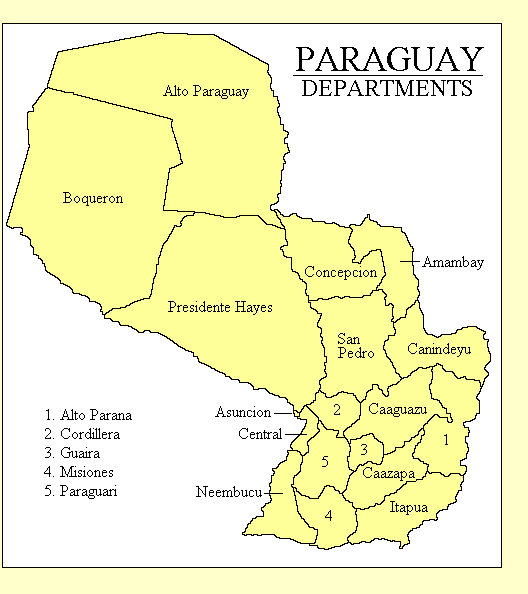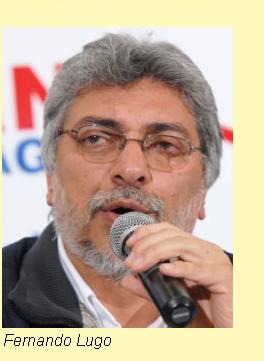

REPUBLIC OF PARAGUAY
• Official name: Teta Paraguay / Republica del Paraguay (Republic of Paraguay)
• Location: South America
• International organisations: Organisation of American States, United
Nations, World Trade Organisation
• Borders: Argentina, Bolivia, Brazil
• Coastline: None
• Land area: 406,750 Km2
• Population: 6,300,000
• Annual GDP (PPP) per capita: US$4,100 (2009 CIA estimate). World ranking: 125
• Ethnicity: Almost the entire population is of mestizo (mixed Amerindian and European) descent.
• Languages: Guarani (an Amerindian language) and Spanish are official languages.
Over 90% speak Guarani as their first language, but Spanish is the language of government, business and
the media. There is a German-speaking minority.
• Religion: Over 90% of the population are Catholic Christians. There is a small
Protestant minority.
• Form of government: Presidential democratic republic. Paraguay is divided into 17
Departments and the Capital City.
• Capital: Asuncion
• Constitution: The Constitution of the Republic of Paraguay came into effect on 20 June 1992
• Head of state: The President, elected by direct universal suffrage for a five-year term.
• Head of government: The President, who appoints all ministers.
• Legislature: Paraguay has a bicameral legislature, the National Congress (Congreso Nacional). The
Chamber of Deputies (Camara de Diputados) has 80 members, elected for five-year
terms by proportional representation. The Chamber of Senators
(Camara de Senadores) has 45 members, elected for five-year terms by proportional representation.
• Electoral authority: The Superior Tribunal for Electoral Justice administers national elections.
• Freedom House 2009 rating: Political Rights 3, Civil Liberties 3

Political history
Paraguay came under Spanish rule in the 1530s, and from 1559 it was part of the Viceroyalty of
Peru. In 1776 it was transferred to the Viceroyalty of Rio de la Plata, thus becoming a dependency of
Buenos Aires. When Argentina declared its independence in 1811, the Paraguayans remained loyal to
Spain, but preferred independence to rule from Buenos Aires. Paraguay became independent in May 1811.
Jose Gaspar Rodriguez de Francia ruled Paraguay as a benevolent dictator until 1840. Through
the 19th and 20th centuries the country, one of the poorest in the Americas, suffered from chronic
instability. Periods of chaos alternated with rule by strongmen, the most notable being Carlos Antonio
Lopez and his son, Francisco Solano Lopez. In the 1860s Paraguay fought the War of the Triple Alliance
against Argentina, Uruguay, and Brazil, in which it lost half its population.
In the 20th century Paraguay was dominated by political conflict between the conservative
Colorados (Reds) and the liberal Blancos (Whites). The Blancos came to power in 1904, but instability
continued - between 1904 and 1922, Paraguay had fifteen presidents. In the 1930s there was another
disastrous war, against Bolivia. Higinio Morinigo ruled as a dictator from 1940 to 1948.
After another interlude of instability, General Alfredo Stroessner took power in May 1954.
Ruling with the support of the Army and the Colorados, Stroessner held dictatorial power until 1989,
when he was overthrown by the army. The coup-leader, General Andres Rodriguez, introduced the 1992
constitution, which established a democratic system of government.

In May 1993, Juan Carlos Wasmosy was elected as Paraguay's first civilian president for 40
years. Despite a failed coup attempt in 1996, the assassination of the Vice-President and the
subsequent impeachment of President Raul Cubas Grau in 1999, Paraguay has enjoyed the longest period of
democratic government in its history.
Until 2008 Paraguayan politics were dominated by the two traditional parties, the
conservative
Republican National Alliance (the Colorados), and the
liberal Authentic Radical Liberal Party (the Blancos). The
Colorados held the presidency from the restoration of democracy until 2008, when a radical former
bishop, Fernando Lugo, was elected
president as the candidate of the Patriotic Alliance for Change (APC), a coalition of the Blancos and
left-wing parties.
Freedom House's 2009
report on Paraguay
says: "Paraguay is an electoral democracy. The 2008 national elections were considered to be free and
fair... High level corruption cases are a constant in Paraguay's political life...
Transparency International ranked Paraguay 138 out of 180 countries surveyed in its 2008 Corruption
Perceptions Index, below all other countries in the Americas save Ecuador, Venezuela, and Haiti...
The constitution provides for freedoms of expression and the press, and the government generally
respects these rights in practice... Tthe constitution guarantees rights of association and assembly,
and both Presidents Duarte and Lugo have respected these rights in practice... The judiciary, under the
influence of the ruling party and the military, is highly corrupt."
Updated June 2010
|


